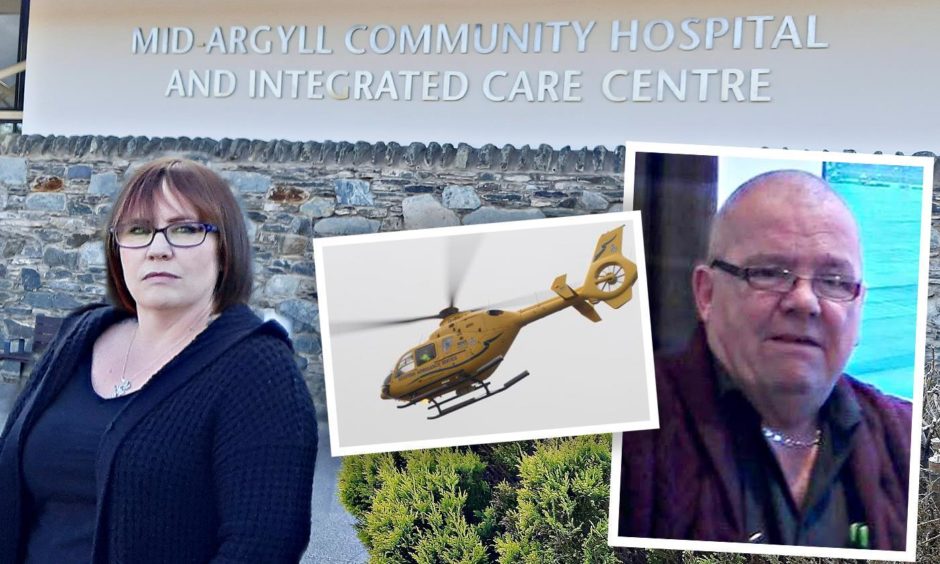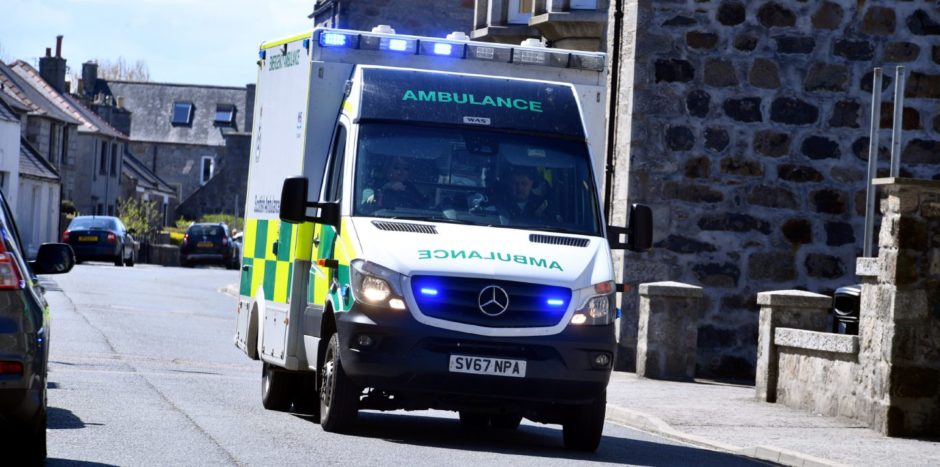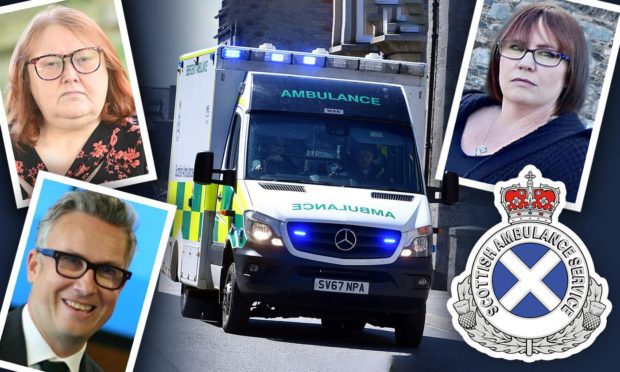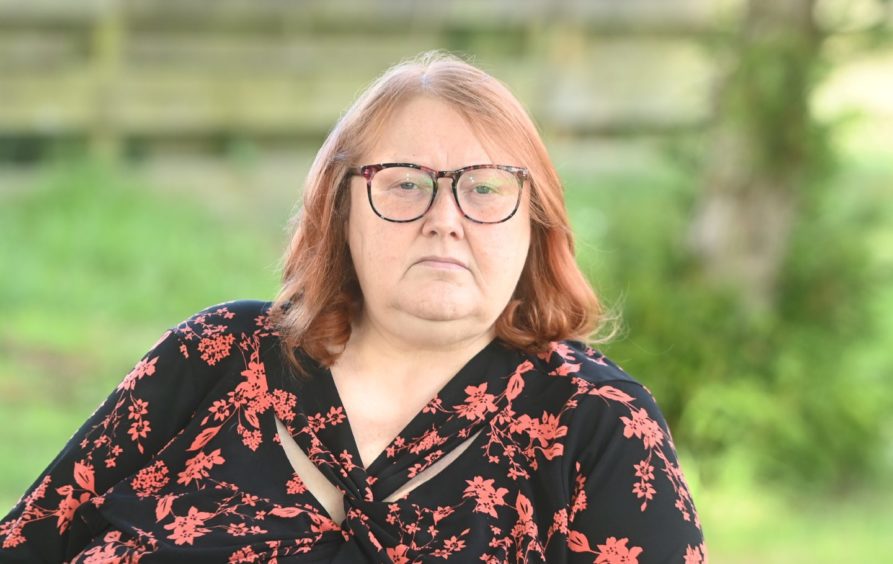Patients left feeling the brunt of ambulance delays have told health bosses the pandemic is “no excuse” for the dire situation.
It comes after NHS Grampian, NHS Highland and Scottish Ambulance Service issued a joint statement to us detailing the continued struggle to cut down on A&E admissions and speed up ambulance response times.
Over recent weeks, the crisis facing the Scottish Ambulance Service has been laid bare with people across the north and north-east left waiting up to 20 hours to get help.
According to health bosses, the problem has been caused by a post-lockdown spike in admissions to A&E wards, which are still operating at reduced capacity due to Covid.
As a result, paramedics are being forced to wait hours before being able to take patients through hospital doors.
‘What humane excuse could there be for a 20-hour wait?’
Ann-Marie Smart, who lives in Fetteresso near Stonehaven, said the pandemic is “no excuse” after hearing the response from the Scottish Ambulance Service’s chief executive, Pauline Howie.
Ms Smart was left waiting 20 hours to be taken to hospital – only to learn she had potentially life-threatening sepsis.
According to Ms Howie, the easing of Covid restrictions is partly to blame for the increased demand, in addition to “lengthy hospital turnaround times” and “staff abstractions”.
“There’s been plenty of time to get to grips with the extra demand,” Ms Smart argued, emphasising that her complaints are not directed to NHS staff or the paramedics working the frontline – instead with the bosses who are not “providing the correct resources” so staff can do their job properly.
She understood that health care frontline workers are “doing an excellent job in a very difficult situation”.
Ms Smart added: “There is no excuse ever, that is ever adequate, to excuse a 20-hour wait for an ambulance.
“We’ve been living with Covid for a year and a half. They know we’ve been living with it for a considerable amount of time
“So, there’s been lots of time to address, to seek the correct resources and funding. And if we don’t currently have them, they should be getting them to solve the problem.
“What humane excuse could there possibly be for a 20-hour wait. I don’t accept that excuse, because it is an excuse, as far as I’m concerned. And there is no excuse, so fix it. Stop making excuses.”
‘What about the ones that were life-threatening?’
Grace Heafey, 63, was told by a 999 call handler that her husband Michael’s agonising chest pains were “probably muscular”.
The 61-year-old, of Ardrishaig, Argyll, later needed a triple bypass heart operation to save his life.
Heart attack survivor Mr Heafey has now reacted to the joint statement, and agreed the pandemic was not an excuse for the situation.
“I think there is a lot still to be answered for,” he went on to say.
“Not to do with the crews, they work hard. We don’t have enough crews. The ambulance service has to have a good look at itself.
“At the time we were in level one. It is not as if we were on the top level tier.
“I can’t accept that as being a viable excuse. We are in a small community.
“The majority of cases are being transported out of the area by ambulance or helicopter. It is not as if we are in an area with high levels of Covid.”
Karen Heafey, 40, daughter of Mr Heafey, added: “I think it’s quite bad that they are constantly using the pandemic to justify the lack of service.

“Pauline Howie apologises to some non-life-threatening patients who are experiencing delays, but what about the ones that were life-threatening?
“From what I can read they are blaming the hospitals for having to wait outside, yet there was an empty ambulance on the days dad was in, but there was no one to drive it.
“Seems like push the blame elsewhere and use the pandemic to justify the rest.”
Candid response – but how does it get fixed?
Iain Anderson, chairman of communications agency Cicero/amo, said there was some relief in hearing the issue was being acknowledged and not brushed under the carpet.
Mr Anderson called for “urgent” medical help for his mum, who is in her 80s, at about 6pm – but it was not until nearly 13 hours later that paramedics finally arrived.
Reacting to the statement, he said: “I think it was a very candid and open response.
“What is clear is that there are huge strains on the system – and that’s now obvious for everyone to see.

“To get a response which demonstrates that there’s a very open understanding that the system is near breaking is refreshing, rather than a response which is trying to say there isn’t a problem.
“You acknowledge the problem, then you can then start to look for the solution.
“Having acknowledged this, there’s now a big question as to how it gets fixed.
“The broader, macro point which is acknowledged in the response from the ambulance service, which is that the system is massively under strain and it doesn’t look like it’s going to be under any less strain for months to come.
“Because clearly, post-Covid, people are kind of coming out of that lockdown period, and they haven’t necessarily had the health care and support that they might have done through that period.
“It’s just creating this massive demand. So, there is a question about how that massive demand – if that is going to go on for weeks and months – how that is going to be met.”
Mr Anderson went on to say that the care in hospital is “absolutely superb”, but “it’s the getting there bit problem at the moment.”
Health bosses response to delays
In their joint statement, NHS Grampian said that a perfect storm of circumstances meant staff were “under more pressure than at any other time throughout the pandemic”.
Prof Hiscox said that tightened capacity in hospitals had combined with staffing issues to push resources to breaking point.
Prof Hiscox and NHS Highland chief executive Pam Dudek also thanked the public for their support.
“Although society is reopening, health and care services are under more pressure than at any other time throughout the pandemic,” Prof Hiscox said.
“We do not work in isolation: if one service is impacted, it affects us all.
“Using our emergency department at Aberdeen Royal Infirmary as an example; staff there are experiencing periods of exceptionally high demand.
“This can result in abnormally intense surges of patients arriving at hospital, at the same time, and can unfortunately lead to us being unable to admit more patients to the department.
“This is when ambulance stacking occurs.
“That pressure isn’t just affecting the emergency department and ambulance service – it is felt right across our system including social and primary care.”
Pauline Howie, chief executive of the Scottish Ambulance Service, said: “We are sorry that some non-life-threatening patients are experiencing delays and we are working in partnership with health boards to mitigate these pressures as much as possible.”
People are being urged to call 111 or contact their GP for advice in situations which are not life-threatening.

